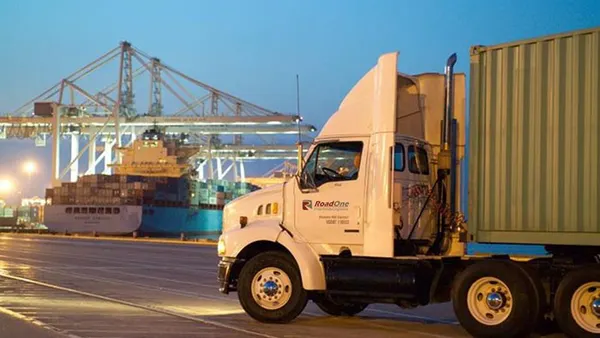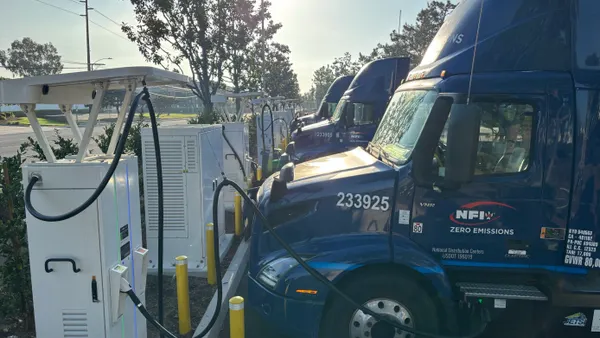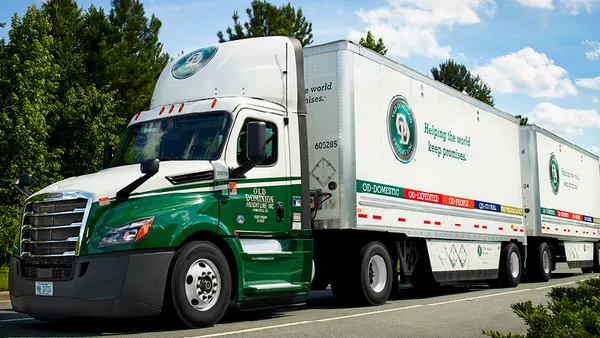Looking back at the previous 12 months as a whole, it's difficult to compare any other year to 2021. The supply chain world is imploding and will soon sink into Middle Earth, right?
Well, if you look in your rearview mirror, you'll find evidence that the woes of today are the same woes of our yesteryears.
Consider the driver shortage: The mainstream media and the pronouncements from Capitol Hill paint a very dire picture. And how about infrastructure and fuel prices? I don't have to tell you that our roads and bridges didn't start crumbling yesterday.
During a session at the American Trucking Associations' Management Conference & Exhibition last October, panelists discussed when the supply chain would get back to "normal."
Prognostications included "mid-2022" and "Q4 2023." But one panelist responded that she hoped we would never get back to what we considered "normal" before this latest crisis.
"In my mind, we shouldn't go back to normal, because normal isn't working right now," said Gail Rutkowski of the National Shippers Strategic Transportation Council.
I whole-heartedly agree with her. The future doesn't have to be what it used to be, to paraphrase baseball great Yogi Berra.
Woes of our yesteryears
We scramble through crisis after crisis and never get to the real fixes before being faced with more. To me, that's what Rutkowski was talking about.
Here are three of the prominent crises I've heard time and time again:
Driver and capacity constraints
The American Trucking Associations' chief economist, Bob Costello, said the driver shortage could hit 160,000 over the next decade if current trends persist.
It sounds severe, but six-digit predictions from the ATA like that have been staples for as long as I can remember. I've heard this gloom and doom discussed at every transportation conference I've attended since 1999.
Speaking strictly about LTL, we always run short of all things capacity. It's the way operations have always been planned and executed. You never staff to handle peaks and surges; you react and flex to them.
That means you are perpetually in need of drivers, doors, trailers, tractors, fifth-wheel grease and so on during periods of abundance. And that's a good thing, provided your people have a plan to flex up when needed.
Traffic and infrastructure problems
Congestion has also become a staple of the trucking industry. Billions of dollars have been lost to traffic congestion and road closures for many years.
Perhaps we'll see some improvement in the not-too-distant future, once funds from the federal infrastructure spending package start being doled out. Whenever that starts, it won't be a day too soon.
Were it not for the excellent routing technology that is available in today's market, infrastructure-related losses would be much greater.
Soaring fuel prices
Over the years, diesel and gas prices have fluctuated like Texas weather. The latest spike, thankfully, has eased somewhat. But rest assured that we'll be complaining about high prices again before too long.
Is the driver shortage a company problem or an industry problem? Is poor infrastructure a company problem or an industry problem? Is the fuel crisis a company problem or an industry problem?
If your answer to all of these questions was the latter, then what, as an industry, are we going to do to resolve them?
Beyond the forklift
I'll admit to being a bit of a here-and-now kind of person. But I find future-looking conversations about autonomous and electric vehicles fascinating. The industry should continue to look for innovation in all things trucking.
In an industry whose greatest innovation for so many years was the forklift, certainly there is room for improvement.
But while we're looking ahead and planning for tomorrow, doesn't it make sense to place equal focus on things that can be brought to reality sooner?
In an industry whose greatest innovation for so many years was the forklift, certainly there is room for improvement.

An important message for us to take into this near year is that none of the issues mentioned are novel, even in these unprecedented times.
We have been through these crises before, and the industry has always worked through them — sometimes with confident strides and other times stumbling steps.
Transportation is the heartbeat of the economy, trucking being the essential component. I think with that kind of power, the trucking industry is in an enviable position to dictate rather than react.
Otherwise, 22 will be "déjà vu all over again," as Berra said.
Lanny Fleming began his career with Roadway Express in 1977. He was with American Freightways and FedEx Freight for 20 years, and UPS Freight for six. Views don't necessarily represent those of Transport Dive.











